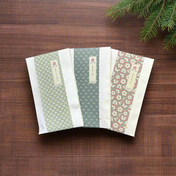Spring
- Hachijyuhachiya 八十八夜 - Literally the "88th night" after the start of spring in the lunar calendar. This is traditionally when the tea harvesting season begins (ceremonially since of course the best timing depends on many other factors). Drinking tea picked on this day is said to bring good fortune and health throughout the year.
- Hashiri 走り - "running" implying that farmers run to harvest the tea extra early. Add a "O" 大 meaning "large" to the front for "extra early" meaning.
- Hatsutsumi 初摘み - The first plucking, or first harvest, of the year. Most places do not pluck by hand anymore, but may do so for this first harvest
- Ichibancha 一番茶 - The general term for "first flush"
- Shincha 新茶 - Literally "new tea", it is less a type of tea than the timing the first few weeks after harvest (no standard definition) when the tea leaf is still "new" and fresh. Theoretically, this could refer to any harvest including summer and autumn, and any tea. But by default it generally means high quality spring-harvested sencha.
Summer
- Nibancha
- Yanagi / Yanagi bancha
Autumn / Winter
- Sanbancha
- Yonbancha
- Shutobancha (or aki-fuyu-bancha)


